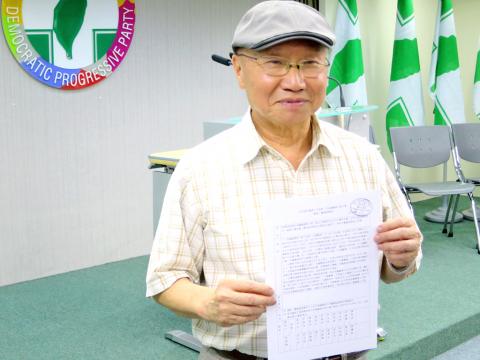Former Democratic Progressive Party (DPP) legislator Chen Zau-nan (陳昭南) yesterday submitted a petition demanding that the party freeze the Taiwanese independence clause in its party charter in the upcoming party congress, which he said would help the DPP regain power.
The petition called for freezing the first article of the party charter, usually known as the Taiwanese independence clause, which calls for the “establishment of an independent sovereignty known as the Republic of Taiwan.”
The petition received more than 40 signatures, 20 of which came from party representatives.

Photo: Chen Hui-ping, Taipei Times
Chen said he had made the same proposal in 2000, adding that Taiwan was already an independent sovereignty under the name of the Republic of China and its future should be decided by its 23 million residents.
The clause had fulfilled its purpose and the DPP has no need to further push Taiwanese independence, Chen said.
The move would improve the party and the nation, Chen said, adding that the cross-strait issue should not be an obstacle barring the DPP from returning to power and keeping the KMT in power.
DPP Chairperson Tsai Ing-wen (蔡英文) knew nothing of the proposal until he brought it up yesterday, Chen said, adding that although he could not advance the issue as he was not a national party representative, he would continue to push the proposal.
DPP Legislator Tsai Chi-chang (蔡其昌) said freezing the clause would have no real meaning, adding that the Resolution on Taiwan’s Future (台灣前途決議文) had in large part superseded the Taiwanese independence clause.
DPP legislators Lee Ying-yuan (李應元) and Chen Chi-mai (陳其邁) both disagreed with the proposal to freeze the clause, with Chen Chi-mai saying that the clause formed part of the basic tenet of the DPP charter and represented the values and the spirit of the party.
Lee said the clause was a precious historic article and there was no need to freeze it because the spirit of the resolution was accepted by party members and by the international community.
National Cheng Chi University professor Tung Chen-yuan (童振源), one of the petition’s drafters, said the clause had become an obstacle to the DPP, and resolving the issue depended on the determination and willingness of Tsai Ing-wen.
The clause is detrimental to Taiwan, Tung said, adding that even if the DPP were willing to implement the clause, it lacks the power to do so in the near future because ratifying the Constitution requires the support of three-quarters of the Legislative Yuan.
Freezing the clause would be a step toward unifying Taiwan’s consensus on cross-strait issues, Tung said.
Meanwhile, student activist leader Chen Wei-ting (陳為廷) spoke against the freeze on Facebook, saying it would be an illogical move and like an ostrich burying its head in the sand in response to danger.
If the DPP were to agree to the freeze, it would need to brace itself to be replaced as the main opposition party, he said.
Additional reporting by CNA

NATIONAL SECURITY THREAT: An official said that Guan Guan’s comments had gone beyond the threshold of free speech, as she advocated for the destruction of the ROC China-born media influencer Guan Guan’s (關關) residency permit has been revoked for repeatedly posting pro-China content that threatens national security, the National Immigration Agency said yesterday. Guan Guan has said many controversial things in her videos posted to Douyin (抖音), including “the red flag will soon be painted all over Taiwan” and “Taiwan is an inseparable part of China,” while expressing hope for expedited “reunification.” The agency received multiple reports alleging that Guan Guan had advocated for armed reunification last year. After investigating, the agency last month issued a notice requiring her to appear and account for her actions. Guan Guan appeared as required,

Japan and the Philippines yesterday signed a defense pact that would allow the tax-free provision of ammunition, fuel, food and other necessities when their forces stage joint training to boost deterrence against China’s growing aggression in the region and to bolster their preparation for natural disasters. Japan has faced increasing political, trade and security tensions with China, which was angered by Japanese Prime Minister Sanae Takaichi’s remark that a Chinese attack on Taiwan would be a survival-threatening situation for Japan, triggering a military response. Japan and the Philippines have also had separate territorial conflicts with Beijing in the East and South China

A strong cold air mass is expected to arrive tonight, bringing a change in weather and a drop in temperature, the Central Weather Administration (CWA) said. The coldest time would be early on Thursday morning, with temperatures in some areas dipping as low as 8°C, it said. Daytime highs yesterday were 22°C to 24°C in northern and eastern Taiwan, and about 25°C to 28°C in the central and southern regions, it said. However, nighttime lows would dip to about 15°C to 16°C in central and northern Taiwan as well as the northeast, and 17°C to 19°C elsewhere, it said. Tropical Storm Nokaen, currently

PAPERS, PLEASE: The gang exploited the high value of the passports, selling them at inflated prices to Chinese buyers, who would treat them as ‘invisibility cloaks’ The Yilan District Court has handed four members of a syndicate prison terms ranging from one year and two months to two years and two months for their involvement in a scheme to purchase Taiwanese passports and resell them abroad at a massive markup. A Chinese human smuggling syndicate purchased Taiwanese passports through local criminal networks, exploiting the passports’ visa-free travel privileges to turn a profit of more than 20 times the original price, the court said. Such criminal organizations enable people to impersonate Taiwanese when entering and exiting Taiwan and other countries, undermining social order and the credibility of the nation’s